Blade Runner 2049 is out now on 4K, Blu-ray, DVD, Digital Download and On Demand. The sci-fi epic from Academy Award-nominated director Denis Villeneuve (Arrival) is the anticipated follow-up to the acclaimed sci-fi classic Blade Runner starring Harrison Ford.
Check out our review of Blade Runner 2049
The film stars Ryan Gosling (La La Land, Drive) as K and Harrison Ford (the Star Wars films, Witness), reprising the role of Rick Deckard. The cast also includes Ana de Armas (War Dogs), Sylvia Hoeks (Renegades), Robin Wright (Wonder Woman), Mackenzie Davis (The Martian), Carla Juri (Brimstone), and Lennie James (TV’s The Walking Dead), with Dave Bautista (the Guardians of the Galaxy films) and Oscar winner Jared Leto (Suicide Squad).
EF had a fascinating chat with Ron Bartlett (Re-Recording Mixer), Mark Mangini (Supervising Sound Editor) and Doug Hemphill (Re-Recording Mixer), who discussed working on Blade Runner 2049.
Mark Mangini
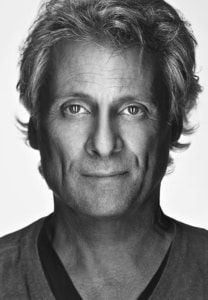
In addition to Oscar-winning Supervising Sound Editor Mark Mangini’s work on Blade Runner 2049, he has an impressive roster of critically-acclaimed films including Mad Max: Fury Road, for which he previously won an Oscar, The Accountant, starring Ben Affleck, Star Trek, starring Chris Pine and more.
Doug Hemphill
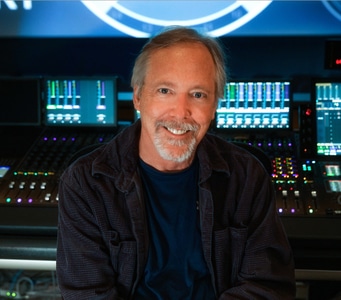
Prior to his sound mixing work on Blade Runner 2049, Doug previously worked on the original 1982 Blade Runner. His recent work includes a wide variety of genres such as Life, starring Jake Gyllenhaal, Rebecca Ferguson and Ryan Reynolds, Billy Lynn’s Long Halftime Walk starring Joe Alywyn, X-Men: Days of Future Past, starring Patrick Stewart and Hugh Jackman and Life of Pi.
Ron Bartlett
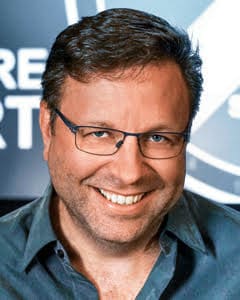
Along with Doug Hemphill, Bartlett also worked as sound mixer on both
Blade Runner 2049 and the original 1982 Blade Runner. He also worked on memorable projects such as Ridley Scott’s Prometheus, Deepwater Horizon, starring Mark Wahlberg and Life of Pi, for which he was Oscar nominated.
All three work for Formosa Group (www.formosagroup.com) – a full service post-production sound company comprised of award-winning talent, headed by CEO Robert C. Rosenthal and EVP Matt Dubin.
Among its many divisions, Formosa Group offers independent and studio filmmakers and content creators services including sound supervision, editorial, re-recording mixing and music editorial for film, broadcast and other platforms. It is home to some of the most creative and well-respected sound artists in the entertainment
industry today.
Formosa Group has seven unique divisions – Features, Broadcast, Music, Interactive and Villa (Commercials) – and seven locations in the greater Los Angeles area.

RB: Ron Bartlett – Re-Recording Mixer
MM: Mark Mangini – Supervising Sound Editor
DH: Doug Hemphill – Re-Recording Mixer
Thank you for taking the time to talk to us today.
Mark Mangini: I love talking about sound, thank you for the opportunity.
First off, how did you all get involved with the project?
MM: Denis Villeneuve and our film editor, Joe Walker, had seen Mad Max: Fury Road while filming Blade Runner 2049 and liked the work I had done (it won an Oscar for Sound Editing.) They asked me to come to Budapest to meet and talk about the film. I was in London at the time for the premiere of a sound installation I worked on at the British Museum, and flew over a few days later.
Denis and I spoke briefly on-set, where he was in the middle of shooting. Without having seen a script, I pitched my ideas in front of Roger Deakins and the entire crew, who waited patiently as I suggested what the universe of Blade Runner might sound like. A complete shot in the dark. I walked over to the editing room, where Joe showed me a few cut sequences, such as K’s walk in the desert and the walk through the casino. We talked for awhile, mostly about silence.
A few weeks later, they called and asked me to join them when they returned to Los Angeles to start post-production. I was thrilled.
Doug Hemphill: It’s funny; Ron Bartlett and I had done the “final” cut of the original Blade Runner about six years ago. We never asked, but Denis somehow found us. We’re glad he did!
What are your memories of the original Blade Runner, and what did you think when news of a sequel came about?
MM: I was deeply moved by the first film; it’s one of my favorite films of all time. A seminal moviegoing and sound experience. It’s so iconic, I wasn’t sure a sequel would or could do it justice. But after seeing Sicario and Arrival, I felt Denis was the right director to take it on.
I think our film commends Ridley and affirms the greatness of the first film, which was widely misunderstood after its initial release. Our film reintroduces the audience to the great science fiction themes the first film asks us to consider and expands on universal questions about what makes us human.
The things I remember most from the first film, in no particular order, are Roy Batty’s soliloquy, all of Vangelis’ music, the iconic Blade Runner booms in the main titles, the spinners, the atmospheres in Decker’s apartment, Priss’ insane screams when she dies, and the off-world announcements.
DH: I believe Ridley’s film is a masterpiece, and it has taken the passage of time to cement that. Sometimes films become much more appreciated as time passes.
Ron Bartlett: I loved the original Blade Runner. In fact, when it came out, I was a projectionist working my way through college and played it in the theater.
Doug and I were asked by Ridley Scott to mix his “Directors Final Cut.” When I heard of the sequel, I thought wow, they better nail this one or there are going to be a lot of upset fans out there. It would be a tall order to get it right. When Denis called us, I was of course so thrilled!!! Doug and I are big fans of Denis’ work.

What’s the difference between Sound Editing and Sound Mixing?
DB: In today’s world of post-production, the sound editor/supervisor develops the soundscape with the director and picture editor. This happens in advance of mixing on a dub stage. Mixers then try to focus and develop these ideas further on the stage. It’s a very intuitive work environment. Every hunch or “maybe if — ?” has creative meaning.
MM: Filmmakers and non-filmmakers alike think what we do is mysterious and find it hard to understand the differences, especially since there is only one soundtrack and both disciplines have “sound” in their names.
The sound editor is the author of the audio content of a film, the actual things you hear that have been gathered and created to be heard. This is the “what” you hear of a sound track. The sound mixer then captures that content, artfully organizing and arranging it by recording it into a finished soundtrack.
The mixer is responsible for how you hear the sound. As with many other film disciplines, one cannot exist without the other.
RB: Sound editing is the creative process of choosing and recording sounds to fit the picture and realize the director’s vision. Those sounds are designed, layered, then cut in sync with the picture to tell the story. Our job as mixers are to understand the Director’s intent/vision, and then balance all the sounds you hear in the film to achieve that. It’s a very creative and collaborative effort form all of us to make that
happen. We focus in on certain sounds, create an atmosphere for the audience to fall into the movie while keeping the dialogue clear and present to help character development and tell the story.

Working on such a huge film will no doubt present lots of challenges. What obstacles did you have to overcome to make sure Blade Runner 2049 stood out on its own?
DH: Time. It was a big film; not a big schedule. Imagine a mixing stage with twelve people who all trust one another and are not afraid to fail. That’s the way you work fast and accurately. Confidence.
RB: Mixing Blade Runner was a tall order. Keeping the original in mind while pushing the limits of a modern track was challenging and inspiring. The tone of the music was especially on Denis’ mind from the beginning. We had such a rich palette of sounds from the composers Hans and Ben and all the creative sound design from Mark and Theo to balance. We were very judicious to pick and choose what helped the story and keep clarity for the listener. Denis loved the sounds from the CS-80
synthesizer which was an iconic element in the original Vangelis score.
MM: First and foremost, building a unique and believable sonic world unto itself. Science fiction films have a special challenge in sound that make them just that much more complex and challenging to pull off. I call it “world building.” Contemporary and historical films take place in a universe we know and understand, in a universe that we’ve heard. We know what that universe sounds like. The brain signs off on these tropes quickly and efficiently, aiding in the audiences suspension of disbelief.
In science fiction, we don’t have that advantage. We not only have to create and design entire sonic worlds from whole cloth (no simple matter, that,) but we have to make them believable the first time you hear them.
Second, we wanted our movie to feel new, while still honoring the first film. We wanted to be fresh, yet help the audience feel connected to the original film. This meant taking a great deal of time to deconstruct the first Blade Runner and understand what made it tick, sonically, so that we could make our movie feel unique yet recognizable, using similar conceptual ideas but never copying.
Upon analyzing the first film’s individual sound components (dialog, music and sound effects,) we discovered that large stretches of the film utilized musical pads or tonalities, “sound design” if you will, to create mesmerizing sonic atmosphere. Perhaps Aural Architecture would be a good way to think about it, the things the audience hears (instead of sees) when in a particular space or location.
These were sounds that, on first listen, might be considered music, but didn’t really have melody or rhythm, and yet conveyed a feel or emotion without being musical score. To that end, sound designer Theo Green, David Whitehead and I composed a large library of modern, re-conceptualized musical ambiences (Aural Architecture) to house our movie in.
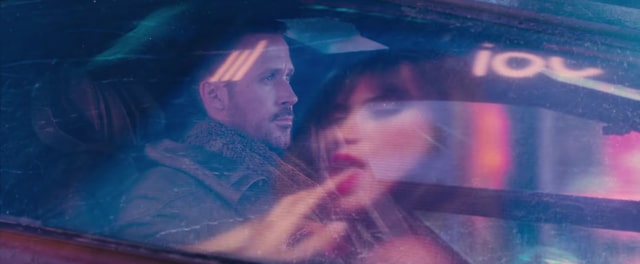
Making a film is, of course, a collaborative project, but what was your personal process for producing sound for the film? Do you get to see the final script first etc?
RB: This was a very seasoned crew of very high caliber sound professionals. All of us really tried to bring our “A” game showing great respect to Denis and his vision. There was a lot of ideas thrown into the pot and a major contributor was Joe Walker the film editor. Joe was instrumental in our process, guiding us and lending his well-tuned ear along the way.
DH: It’s always the actor’s voices that take me through a story. I watch the film, and I look for themes and emotions that catch me. Once I plug into the actors, I’m set. Support them and the story with sound, and it’ll all be good.
MM: I did not get to see the script. In fact, I flew to meet Denis Villeneuve to pitch my ideas without knowing anything about the film… at all. Even once hired, the script was strictly guarded and was only viewable on a secure website (no hard copies anywhere) that went invisible every couple of minutes on my computer monitor lest someone look over my shoulder and read it unauthorized! As such, I began by watching the early edits of the film by myself, and with Denis and Joe, many times,
over and over, to understand its rhythms and look for inspiration.
In my first spotting session, Denis urged Theo and I to “compose” with sound. This meant being free from the constraints of what is seen on screen and allowing sound to work in large swaths, capturing the emotion or feel of a scene without using film score. I use a lot of intuition and musical sensibilities when I design for a film. I’ve been a guitarist/composer all my life and I try to bring those sensibilities to bear when I design and create/compose sound. I think a lot about timbre and rhythm and dynamics.
What a sound designer does is not unlike what a film composer does; we just use sounds that aren’t very melodic. Some of my earliest textures were made from distorted guitars and bells and modal chimes. I began this design process, as I always do, by recording and creating a lot of raw material. My team and I created a “palette” of sounds, much like a classical painter might do with the colors he blends on
his palette before applying them to the canvas. This would allow me to be more creative, being unfettered by the restrictions of syncing to picture.
I then shifted into something akin to what an abstract painter might do to apply these sounds.
I built a work session that spanned the entire length of the film with no sound in it, my blank canvas. I loaded into this audio session palette the most evocative sounds we had created from the previous several months and began a Jackson Pollock-like sound process, bombing the blank canvas with a variety of sounds. I did this often without regard for their placement in the film, sync with anything we see on
screen, or where they might actually belong, to see what would “stick.” Over time, I discovered what worked and what didn’t, and finished the entire first phase of design for the film in about a month of this style of work.
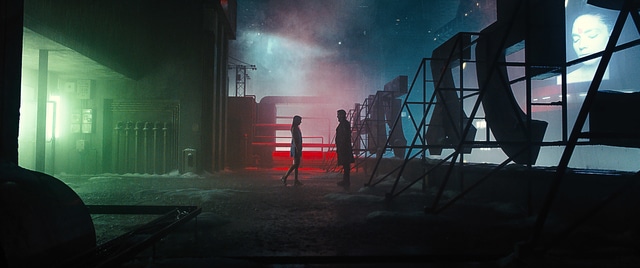
How do Denis Villeneuve and Ridley Scott differ as visual storytellers do you think?
MM: I don’t think they differ very much as visual storytellers. They are both gifted in their ability to inspire and inform the audience, and to put evocative and beautiful images on the screen that are more than just pretty things to look at. Where I think they differ is that Denis puts a very high premium on the emotional content of a scene and will sacrifice pace to achieve it. He is comfortable in long, languid quiet moments that don’t seem to be doing much at first but, without which, the film loses its profundity. In that sense he is an old-fashioned director. Ridley, I think is a more modern director in his directness of storytelling style and pacing. Neither style is better than the other; they are simply different means to tell a story.
RB: Both have such a keen visual sense. Denis has a real talent for finding the human story through all his films. Ridley set the bar very high for that in the original. Ridley is very accomplished artist in his own right which translates directly to every film he makes. You put that together with such heart and sensitivity and you get an astounding piece of art like Blade Runner 2049.
DH: That’s very much about context. They are both very focused visually. Nothing ends up in the frame that they didn’t put there. I was excited about Denis doing Blade Runner 2049 based on themes that Ridley developed in the original Blade Runner.
Emotion is at the forefront of every piece of sound heard within the film. So much so, that Blade Runner 2049 has a very unique ambiance. Was this something that organically gets discovered as you work on the project, or a conscious effort from the start to capture a particular essence?
RB: I think all of us, from the very start, felt the emotional content was so present in the film. We always gravitated towards those sounds and the certain elements in the score to bring out an entire range of human emotion to elevate the film.
MM: This was always at the forefront of our discussions and a conscious decision made early on. As I talked about earlier, Denis wanted Theo and I to compose with sound. This meant using sound that transcended the borders of the film, non-diegetic. Sound is often considered that department that puts in everything you see on screen (the gunshots, the car skids, the spaceship sounds, etc.) We endeavored to “expand the frame” in that regard, to allow you to hear and feel things you didn’t see
much in the way a film score works. You never see the orchestra, right? But you feel its pulse throughout a film.
Denis is a very economical director. He wanted to use score when it was most necessary, which makes it so much more powerful. As sound designers, if we could do some of the heavy lifting in composing sound to give the appropriate emotional core to a scene, the score could come in, like the cavalry, to achieve those even bigger successes that it is so great at doing.
When we played our final mixes for Denis, unlike many directors, he would not obsess much about detail or give overly granular notes on sound. He would most often start by explaining how the sound that he had just heard made him feel. This was often the starting point for finding a direction to improve the film sonically. This is quite prescient on the part of any director and a great way to get to a successful sound mix. Determine what a scene is saying, what you want the audience to feel from that, and then pursue all the leads that contribute to achieving it. Once you have this insight, the mechanics of how to get there become quite simple.
DH: Denis, and the mix crew as a whole, would get down to the bare bones of what worked. You feel it when it works. Get rid of the fog; get rid of the grey. Get to the essential sounds that tell the story, and move forward. Good creative instincts always win the day.

What was the most demanding part of working on Blade Runner 2049?
DH: The most demanding part of Blade Runner 2049: having to stop. We all wanted to keep going. It was wonderful.
MM: Keeping it a secret. Seriously.
Working on the film itself was a joy. I relish creative challenges and had an amazing time and team to work with. Yet, everyone in the world wanted to know about our film, its plot, anything really. We signed the most stringent NDA’s (non-disclosure agreements) ever. We had to build secure and encrypted servers to work off of. We had a script to follow whenever communicating to a vendor or employee so as not to give away even the smallest piece of information. We had lexicon to adhere to
in all email, text and phone conversations that had substitutions for the names of the characters, the filmmakers, or critical dates during the post process, especially when we were screening. We could not use the word Rachel… ever.
RB: Time is always the enemy of creativity it seems. We always want more. Working with such high expectations from everyone really keep my focus on such an elevated level. When I went home, I was exhausted, but so happy with the creative work we did together.
You’ve worked on some very high-profile movies in the past. How did the experience of working on Blade Runner 2049 differ from your past work?
DH: I would say that Denis is one of the more remarkable filmmakers that I’ve met. There is always something new to learn, and Denis draws from a very deep well. He’s a true gentleman, but not someone who is given to compromise. It’s a winning combination.
RB: We’ve worked with a lot of fantastic directors in the past, but I’d have to say that Denis is one of the best we’ve ever had the pleasure of collaborating with. His sense of story-telling is at such a high level, he quietly expects you get it and bring your creative ideas to the party. You can’t ask for much more than that.
MM: Not much at all. What I’ve discovered is that directors working at that “high” level all share some important and common traits; they are all master storytellers, they are fervent collaborators, and they trust the people that they work with. Denis Villeneuve, like George Miller, like Steven Spielberg, like Joe Dante, has a religious belief in the story-telling abilities of sound, and puts time, effort, money and resources into making sound a vital storytelling tool in their films.
What might have made Blade Runner 2049 different from previous work was a personal sense of responsibility to do justice to the first film and the anxiety that brought to me. The first film was so beloved, I felt the pressure every day. I read the blogs and forums, and journalists’ predictions and leaked stories, and everything that surrounded the anticipation of the film. All I could think to myself was, “I can’t screw this up.”

Is there a particular scene (that you worked on) that you are particularly proud of in Blade Runner 2049?
MM: Not a scene, but a sequence: from K’s walk in the desert through the “hologram funhouse” (where he sees projections of Elvis and Marilyn Monroe, etc.) This sequence lasts over 12 minutes, and much of its potency and mystery is a product of our sound design (as well as some compelling imagery from Mr. Deakins.) There is almost no dialog and there is no music for 12 minutes, almost unheard of in modern filmmaking. It is beautiful in its deep silences, as well as the stark punctuations
that shatter it. I feel it’s a great study in dynamics and how to create mood and tension without the usual tropes.
RB: There are a lot of scenes I really love. The walk to Vegas casino with the bees is one. I was lucky enough to perform and record the drums in that scene which were used throughout the film as a nod to the original for transitions and just plain bold power. The sea wall chase and fight was another which Denis wanted us to play as a very “Operatic movement” of emotion carrying us all the way through to the final scene in the snow. Great dynamics and artistic emotional moments were the mantra.
DH: The rain on the rooftop with Joi. I play the rain as a romantic scene. Very delicate and soft. When the K gets an incoming call, the moment is lost, and the rain returns to a cold, hard and wet sound. It’s the little things.
The film was a huge critical hit and has been represented well at awards season – including BAFTA & Oscar recognition. That must be fulfilling to know that the film is so well received, and struck a real chord with audiences?
MM: I wasn’t surprised by the reception of the film and how audiences feel about it. That is to say, from the first time Denis and Joe showed me the film, I knew it was one of the great films of all time. By the time I finished working on it, 9 months later, I knew this was one of the best films I had ever worked on, one of the best sounding and one of the best professional experiences I had had. Needless to say, the awards recognition is icing on the cake and quite satisfying.
What has particularly pleased me is that you have noticed, as have audience members in countless screenings, the carefully crafted and arcane sonic subtleties we created in ways that aren’t usually noticed in film appreciation.
Most often, what I do goes completely unnoticed, as if the microphone on the set picked up all the sound you hear in a finished film. You saw the emotional arcs in sound, the delicate work we did. That’s so gratifying to be noticed for the intelligent artistry our team put into this.
RB: It is always very nice to be recognized by the audience and your peers. It’s quite humbling. This film is very special to all of us and I’m so glad a lot of other people feel the same.
DH: Blade Runner 2049 has a life of its own now. New fans will continue to get caught up in the questions and emotions this film asks. I’m very proud of this story.
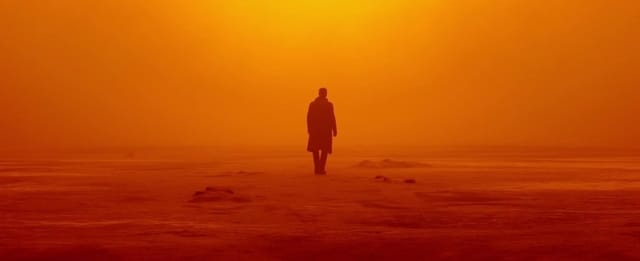
Finally, what future projects are you working on?
MM: I’m doing a really funny comedy called Tag, the true story of five men who continue to play the children game of “tag, you’re it” well into their adult lives. I’m also working on a very powerful film called Arctic about a man stranded in the polar ice cap trying to survive. Perhaps a chilling version of Castaway.
I’m running all over the city documenting the sounds of the city of Los Angeles for a long-range archival sound library project. I’m working on a octophonic museum installation called Last Whispers about dead and dying languages that is touring the worlds museums starting next year. Oh, yeah, and I’m trying to finish a solo guitar album of originals I’ve been working on … all my life.
RB: We are looking forward to Ang Lee’s next film as well as Denis’.
DH: The thing I’ve been working on is trying to spot who the replicants are. It’s tough!
Thank you very much for your time and best of luck for the future!
RB: Thank you!
[brid autoplay=”true” video=”168511″ player=”531″ title=”BLADE RUNNER 2049 International Trailer #3″]
Blade Runner 2049 is available now on Digital, On Demand, 4K, Blu-ray & DVD.


